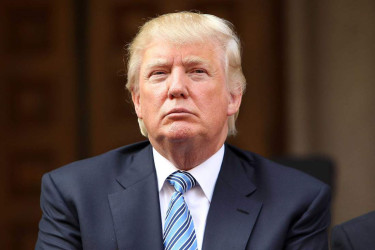NEW YORK/PHILADELPHIA, (Reuters) – Donald Trump swept primaries in five Northeastern states yesterday, moving closer to winning the Republican presidential nomination as he easily defeated rivals Ted Cruz and John Kasich.
Trump scored victories in Pennsylvania, Maryland, Connecticut, Rhode Island and Delaware, U.S. television networks projected. His margin of victory in each state appeared to be even larger than in his home state of New York a week ago, a major show of strength that sets the stage for a potentially pivotal battle next week in Indiana.
Democratic front-runner Hillary Clinton, already in control of the Democratic race, defeated challenger Bernie Sanders in Maryland, Delaware and Pennsylvania.
But in a surprise, Sanders was projected to have won Rhode Island. Connecticut’s Democratic vote was too close to call.
Clinton, in a victory speech in Philadelphia, took aim at Trump for accusing her of trying to “play the woman card” in seeking to become the first female U.S. president.
“Well if fighting for women’s healthcare and paid family leave and equal pay is playing the woman card, then deal me in,” she said to cheers.
Although the race remains fluid, Trump’s wins made it less likely that Republicans would choose their nominee for the Nov. 8 presidential election at a contested convention in July in Cleveland, an outcome seen by Cruz and Kasich as their only chance at the nomination.
“They should drop out because frankly they have no path to victory,” Trump told a Time interviewer at a magazine event in New York honouring influential Americans.
Cruz, already looking ahead to Indiana’s Republican primary on May 3, addressed a crowd in that state just as polls were closing in the Northeastern states.
“I got good news for you: Tonight, this campaign moves back to more favorable terrain,” the U.S. senator from Texas said in Knightstown, Indiana, inside the high school gymnasium made famous by the underdog movie, “Hoosiers.”
APPEAL FOR UNITY

Donald Trump
Clinton’s strong showing in the Democratic race added to the pressure on Sanders to get out of the race or ease his criticism of her.
In her victory speech, Clinton gave a nod to Sanders and spoke of the need for party unity.
“Whether you support Senator Sanders or you support me, there is much more that unites us than divides us,” she said.
Clinton reached out to a wide spectrum of voters, asking for support “if you are a Democrat, an independent or a thoughtful Republican.”
The former secretary of state had an almost insurmountable lead of 275 pledged delegates heading into yesterday’s contests, and Senate Democratic leader Harry Reid told reporters he did not think Sanders, a U.S. senator from Vermont, had a realistic path to winning the nomination.
Sanders, speaking to a big crowd in Huntington, West Virginia, showed no signs of getting out of the race and said he was shedding light on inconvenient truths about how hard life was these days for some Americans.
“The reason that we are generating this enthusiasm is because we are doing something very unusual in contemporary politics. We are telling the truth,” he said.
A total of 118 pledged Republican delegates were at stake in addition to 54 unbound Pennsylvania delegates.
Cruz and Kasich, the Ohio governor, have formed an anti-Trump alliance in an effort to stop the New York billionaire from reaching a first-ballot victory at the July convention.
Former Republican presidential candidate Ben Carson, a Trump supporter, said the deal between Kasich and Cruz would backfire because it smacked of backroom politics.




